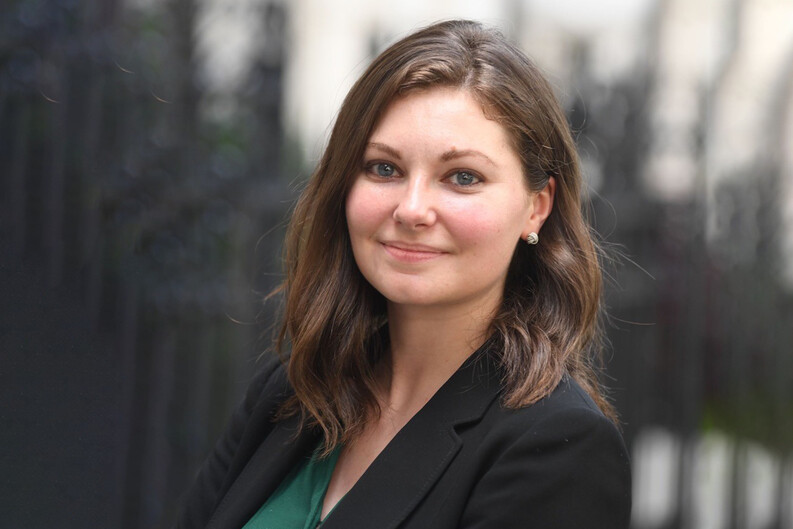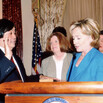MFIA Welcomes 2024–25 Craig Newmark Fellow Stacy Livingston

The Media Freedom and Information Access Clinic (MFIA) at Yale Law School welcomes Stacy Livingston as Craig Newmark fellow for 2024–25. Livingston joins MFIA from the Second Circuit Court of Appeals and from the Knight First Amendment Institute at Columbia University.
Livingston hails from Sanford, Maine. She moved to Hanover, New Hampshire, to attend Dartmouth College, where she majored in Psychology and English.
“I always loved writing,” Livingston said.
That passion would guide her career after college. Livingston worked as an advertising copywriter. But something was missing.
“I wanted to find work that was similar, but had more structure and impact,” she said.
Livingston decided to attend Harvard Law School. For the first half of her 1L summer, she pursued impact litigation as an intern for the Special Litigation Unit of the Legal Aid Society. For the second half, she transitioned to the Southern District of New York’s Pro Se Legal Clinic, run by the New York Legal Assistance Group.
“But I missed the creativity I’d had before,” Livingston said. “I wanted to knit together everything I had worked on so far.” Later at Harvard, she would take a seminar titled “Free Speech Frontiers.”
There, Livingston felt that she found the perfect balance of creativity and structure, and decided to further pursue First Amendment law.
“First Amendment law is catching up more than other legal fields,” Livingston said. “With new technologies and the Internet, we have to be creative in deciding which precedents to use, what to borrow from, what future impacts might look like.”
After graduating from Harvard Law magna cum laude, Livingston joined the Knight First Amendment Institute at Columbia University as a legal fellow. The Knight Institute specializes in litigation at the intersection of First Amendment law and technology.
One of Livingston's most memorable projects from her time at the Knight Institute was their amicus brief for the Supreme Court case Gonzalez v. Google LLC. The Knight Institute urged the court to take a measured approach in interpreting whether a hot-button statute — Section 230 of the Communications Decency Act of 1996 — immunized Google from claims that YouTube’s recommendation algorithms had aided and abetted a series of terrorist attacks.
Though the Supreme Court ultimately declined to address the scope of the Section 230, Livingston felt that her work on the amicus brief demonstrated the broad influence of First Amendment law. “It was exciting to have such a large project fresh out of law school,” she said.
Another memorable project was Livingston’s work on Coalition for Independent Technology Research v. Abbott. The Knight Institute challenged restrictions that effectively prohibited public university professors in Texas from using TikTok, arguing that Texas had violated their First Amendment rights to teach and conduct academic research.
“The university faculty needed to look at the sort of speech people were using on TikTok for their research,” Livingston explained.
Like Gonzalez v. Google, the case illustrated for Livingston the crucial tensions that repeatedly arise in First Amendment law.
“Emerging technologies come with real side effects, but all too often, attempts to address those side effects silence speakers, or stifle free inquiry, or trample on privacy rights,” she said.
Livingston hopes to help create precedent that will strike the right balance between addressing digital-age harms and protecting civil liberties.
Starting this August, Livingston will continue her work at MFIA as the clinic’s Craig Newmark fellow, supported by Craig Newmark Philanthropies. Like previous Newmark fellows Tobin Raju, Rachel Davidson, and Michael Linhorst, Livingston will be a core team member in advancing the clinic’s mission of government transparency and accountability.
One of Livingston’s goals will be to better define the compelled speech doctrine. The doctrine dictates that just as governments often cannot punish or prevent speech, they often cannot require speech.
“Again, here we see an issue where we have to find a good middle ground. I think certain interpretations of the compelled speech doctrine go too far,” Livingston said. “Of course the government can’t compel you to become a mouthpiece for its own messages. But if we treated every regulation that required someone to speak, write, or share information as a First Amendment violation, there’d be nothing left of our government.”
Following Coalition for Independent Technology Research v. Abbott, another goal for Livingston will be to protect academic freedom and free inquiry in schools.
The Media Freedom and Information Access Clinic is a law student clinic dedicated to increasing government transparency, defending the essential work of news gatherers, and protecting freedom of expression by providing pro bono legal services, pursuing impact litigation and developing policy initiatives.


